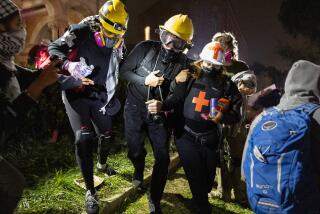UC Berkeley chancellor got tough on protesters
Albert H. Bowker, a former chancellor of UC Berkeley who was a stabilizing force on the campus after the student unrest of the 1960s, died Sunday at a retirement home in Portola Valley, Calif. He was 88.
The cause was pancreatic cancer, the university said.
Bowker went to Berkeley in 1971 with a reputation as an innovator who championed a controversial open admissions program at the City University of New York, which he had led for eight years.
The Berkeley campus, a central battleground of the student protest movement of the ‘60s, had not entirely settled down when Bowker took over, but he moved quickly to demonstrate that a new era was beginning.
Early in his tenure, he suspended two students who had disrupted the class of a noted East Asian history scholar. He ordered the police to clear a building that had been occupied by students opposed to Bowker’s dismantling of Berkeley’s criminology school.
“I think the main function of the university . . . is teaching and scholarship and not changing the world, no matter how desirable that may be,” he told The Times in 1971.
Once the tumult subsided, Bowker began to refocus the institution on its academic mission, abolishing weak departments and opening others. He met the severe financial constraints imposed by then-Gov. Ronald Reagan with practicality and a new emphasis on fundraising.
Under his leadership, alumni support rose from $3 million in 1973 to $23 million in 1979. He also helped create the Berkeley Foundation, which raised the capital for the Bechtel Engineering Center and an expansion of the optometry building.
“Al Bowker was an outstanding chancellor who paved the way for UC Berkeley into the modern era,” Robert J. Birgeneau, Berkeley’s current chancellor, said in a statement this week.
A bulky, rumpled man (descriptions of him often included the phrase “unmade bed”), Bowker was an MIT-trained mathematician who earned a doctorate in statistics from Columbia University in 1949.
He was born Sept. 8, 1919, in Winchendon, Mass., and grew up in Washington, D.C. Bowker joined the faculty of Stanford University in 1947 as an assistant professor of math and statistics. He was chairman of the statistics department for 11 years until becoming dean of the graduate division in 1959. His success developing graduate education at Stanford drew the attention of the City University of New York, which named him chancellor in 1963.
Over the next several years, enrollment in the system’s 20 campuses doubled to more than 200,000. Because of his advocacy, the system abandoned a highly selective admissions process for a more egalitarian policy that opened the system to all graduates of New York City high schools. Enrollment of minorities, particularly African Americans and Puerto Ricans, increased substantially.
When the opportunity arose to become Berkeley’s sixth chancellor, Bowker was ready for the challenge. He found an atmosphere of “deep suspicion if not open warfare,” not only on the Berkeley campus, where the Free Speech Movement erupted in 1964, but throughout the UC system.
He decided at the outset that he would tolerate no sit-ins or unruly demonstrations. He met his stiffest challenge early in his tenure, when hundreds of students occupied the building that housed the criminology school, which Bowker found academically deficient.
Calling in the police to remove the protesters “wasn’t the most pleasant thing in my administration,” Bowker recalled in an oral history some years ago, “and I remember that practically all of my senior officers, the president of the student body, and everybody were there saying, ‘No, don’t do it; there will be bloodshed.’
“Sometimes,” he observed, “you have to crack a few heads.”
One reason he responded so sternly to student rebels was that the campus’ image as a seedbed of disorderly conduct was having a deleterious effect on enrollment -- quite the opposite problem the hugely popular campus has today.
“I’d go to the Central Valley and visit Stockton or Modesto and they’d say, ‘I’m not going to send my kids to a place like that,’ ” Bowker said in a 1995 interview. “Although people don’t admit it, Berkeley was having trouble filling its freshman class, and we were not close to filling the dormitories.”
On other occasions, Bowker took a lighter approach to dissenters. When a group of unhappy students jammed his office one day, all wearing dark glasses, the chancellor greeted them after donning a pair of sunglasses too.
As the campus quieted down, Bowker turned his attention to other pressing matters. He introduced an effective system of preregistration for courses as well as a program that divided students into small groups for academic advisement. He also oversaw a plan for the renovation of campus facilities worn down by a decade of upheavals.
When he announced in 1979 that he would resign as chancellor the next year, he called UC Berkeley a “wild and wonderful place” but said that 20 years as dean or chancellor at three major universities during periods of political turbulence and economic uncertainty was enough.
In 1980, he joined the Carter administration as an assistant secretary for postsecondary education in the newly formed U.S. Department of Education. He later served in high-level posts at the University of Maryland before returning to the City University of New York in 1986 as vice president for planning at its research foundation.
Bowker is survived by a son, Paul, of Cottonwood, Calif; twin daughters, Caroline Anne Bowker Bliss and Nancy Kathleen Bowker, both of Palo Alto; and five grandchildren.
A memorial service is set for 4:30 p.m. Feb. 4 at the Faculty Club at UC Berkeley.
--
More to Read
Start your day right
Sign up for Essential California for news, features and recommendations from the L.A. Times and beyond in your inbox six days a week.
You may occasionally receive promotional content from the Los Angeles Times.







